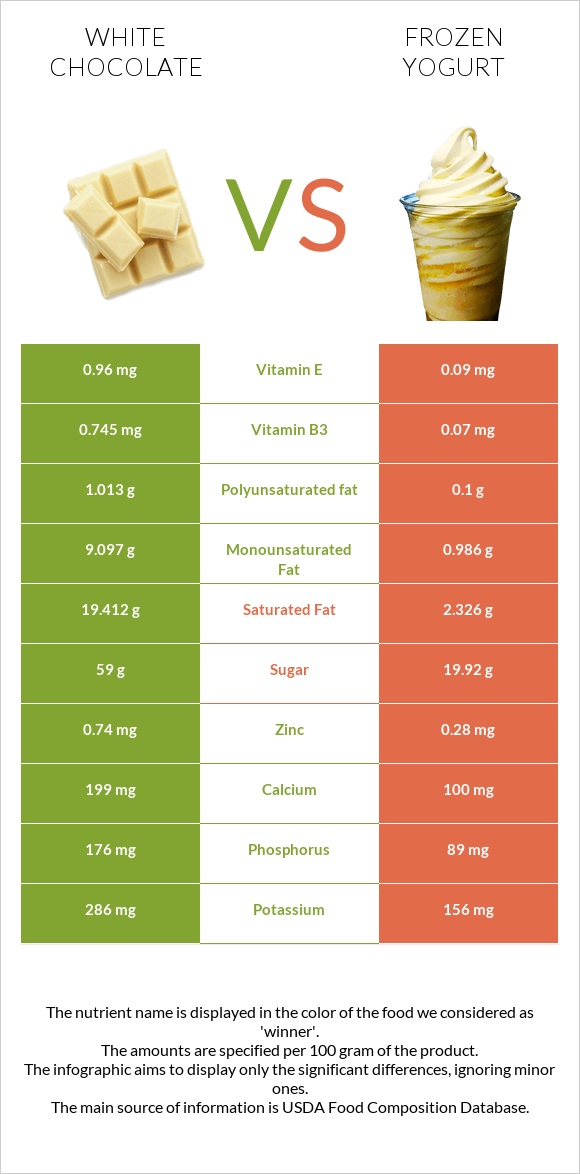White chocolate vs. Frozen yogurt — In-Depth Nutrition Comparison
Compare
The main differences between white chocolate and frozen yogurt
- White chocolate is richer than frozen yogurt in vitamin B12, phosphorus, calcium, vitamin B2, vitamin K, vitamin E, and copper.
- Daily need coverage for saturated fat for white chocolate is 85% higher.
- White chocolate contains 30 times more vitamin K than frozen yogurt. White chocolate contains 9.1µg of vitamin K, while frozen yogurt contains 0.3µg.
- Frozen yogurt contains less saturated fat.
Food types used in this article are Candies, white chocolate and Frozen yogurts, flavors other than chocolate.
Infographic

Infographic link
Mineral Comparison
Mineral comparison score is based on the number of minerals by which one or the other food is richer. The "coverage" charts below show how much of the daily needs can be covered by 300 grams of the food.
| Contains more MagnesiumMagnesium | +20% |
| Contains more CalciumCalcium | +99% |
| Contains more PotassiumPotassium | +83.3% |
| Contains more CopperCopper | +566.7% |
| Contains more ZincZinc | +164.3% |
| Contains more PhosphorusPhosphorus | +97.8% |
| Contains more ManganeseManganese | +∞% |
| Contains more SeleniumSelenium | +136.8% |
| Contains more IronIron | +91.7% |
| Contains less SodiumSodium | -30% |
Vitamin Comparison
Vitamin comparison score is based on the number of vitamins by which one or the other food is richer. The "coverage" charts below show how much of the daily needs can be covered by 300 grams of the food.
| Contains more Vitamin EVitamin E | +966.7% |
| Contains more Vitamin B1Vitamin B1 | +57.5% |
| Contains more Vitamin B2Vitamin B2 | +56.7% |
| Contains more Vitamin B3Vitamin B3 | +964.3% |
| Contains more Vitamin B5Vitamin B5 | +∞% |
| Contains more Vitamin B6Vitamin B6 | +40% |
| Contains more Vitamin B12Vitamin B12 | +700% |
| Contains more Vitamin KVitamin K | +2933.3% |
| Contains more FolateFolate | +75% |
| Contains more Vitamin CVitamin C | +40% |
| Contains more Vitamin AVitamin A | +444.4% |
| Contains more Vitamin DVitamin D | +∞% |
All nutrients comparison - raw data values
| Nutrient |  |
 |
DV% diff. |
| Saturated fat | 19.412g | 2.326g | 78% |
| Fats | 32.09g | 3.6g | 44% |
| Calories | 539kcal | 127kcal | 21% |
| Vitamin B12 | 0.56µg | 0.07µg | 20% |
| Monounsaturated fat | 9.097g | 0.986g | 20% |
| Carbs | 59.24g | 21.6g | 13% |
| Phosphorus | 176mg | 89mg | 12% |
| Vitamin B5 | 0.608mg | 12% | |
| Calcium | 199mg | 100mg | 10% |
| Vitamin B2 | 0.282mg | 0.18mg | 8% |
| Vitamin K | 9.1µg | 0.3µg | 7% |
| Protein | 5.87g | 3g | 6% |
| Copper | 0.06mg | 0.009mg | 6% |
| Vitamin E | 0.96mg | 0.09mg | 6% |
| Polyunsaturated fat | 1.013g | 0.1g | 6% |
| Selenium | 4.5µg | 1.9µg | 5% |
| Potassium | 286mg | 156mg | 4% |
| Zinc | 0.74mg | 0.28mg | 4% |
| Vitamin A | 9µg | 49µg | 4% |
| Vitamin B3 | 0.745mg | 0.07mg | 4% |
| Cholesterol | 21mg | 13mg | 3% |
| Iron | 0.24mg | 0.46mg | 3% |
| Vitamin B1 | 0.063mg | 0.04mg | 2% |
| Fiber | 0.2g | 0g | 1% |
| Sodium | 90mg | 63mg | 1% |
| Vitamin D | 0µg | 0.1µg | 1% |
| Vitamin B6 | 0.056mg | 0.04mg | 1% |
| Folate | 7µg | 4µg | 1% |
| Choline | 29.5mg | 23.1mg | 1% |
| Vitamin C | 0.5mg | 0.7mg | 0% |
| Net carbs | 59.04g | 21.6g | N/A |
| Vitamin D | 0 IU | 3 IU | 0% |
| Magnesium | 12mg | 10mg | 0% |
| Sugar | 59g | 19.92g | N/A |
| Manganese | 0.008mg | 0% |
Macronutrient Comparison
Macronutrient breakdown side-by-side comparison
Protein:
5.87 g
Fats:
32.09 g
Carbs:
59.24 g
Water:
1.3 g
Other:
1.5 g
Protein:
3 g
Fats:
3.6 g
Carbs:
21.6 g
Water:
71.2 g
Other:
0.6 g
| Contains more ProteinProtein | +95.7% |
| Contains more FatsFats | +791.4% |
| Contains more CarbsCarbs | +174.3% |
| Contains more OtherOther | +150% |
| Contains more WaterWater | +5376.9% |
Fat Type Comparison
Fat type breakdown side-by-side comparison
Saturated fat:
Sat. Fat
19.412 g
Monounsaturated fat:
Mono. Fat
9.097 g
Polyunsaturated fat:
Poly. Fat
1.013 g
Saturated fat:
Sat. Fat
2.326 g
Monounsaturated fat:
Mono. Fat
0.986 g
Polyunsaturated fat:
Poly. Fat
0.1 g
| Contains more Mono. FatMonounsaturated fat | +822.6% |
| Contains more Poly. FatPolyunsaturated fat | +913% |
| Contains less Sat. FatSaturated fat | -88% |




